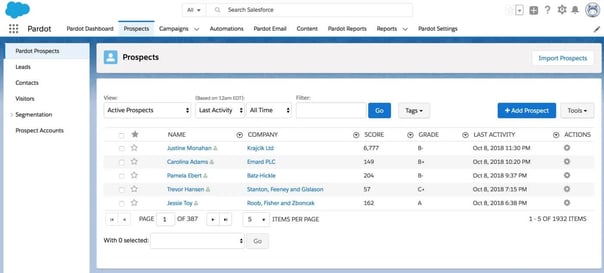B2B marketing automation platforms are the backbone of any successful B2B marketing strategy, especially if you're looking to grow and scale effectively. Most have transcended their traditional roles, incorporating technological advancements like AI.
But with so many B2B marketing automation platforms out in the market, how do you choose which is best for you and your organization?
In this blog post, we explore the capabilities, AI offerings, and pros and cons of six leading marketing automation platforms:
Together, they offer a robust range of features, complexity, integrations, cost, and support to help B2B companies of all sizes find the right platform for their size, budget, and marketing initiatives.
HubSpot Marketing Hubs
Description & Features
HubSpot remains a heavyweight in marketing automation, offering distinct tiers within its Marketing Hub ( Starter, Pro, and Enterprise). Each tier adds more advanced features as you move up.
HubSpot’s comprehensive offering of interconnected “Hubs” for Marketing (Marketing Automation, Website (CMS), and Content), CRM, Sales, Service, and Operations provides an attractive all-in-one platform to grow into a full suite of capabilities with comprehensive visibility across growing organizations.

Here we’ll look at the Marketing Automation Hubs:
HubSpot Starter: Geared toward small businesses or those just beginning with automation, the Starter Hub includes basic lead capture tools, email marketing capabilities, and simple automation workflows. With pricing based per seat, small teams can begin to experience the power of automation without a significant investment.
HubSpot Pro: Small to mid-sized businesses often upgrade to the Pro level to access more sophisticated tools and the ability to manage multiple marketing functions within the same tool. This includes:
- Advanced automation sequences
- Social media
- Ad campaign management
- A/B testing
- Salesforce integration
The Pro Hub demands a deeper understanding of marketing automation strategies, and many businesses benefit from partnering with certified HubSpot agencies for implementation and management.
HubSpot Enterprise: The top-tier offering, Enterprise Hub, is designed for large organizations requiring extensive, customizable automation workflows, predictive lead scoring, and advanced reporting capabilities. This level requires in-depth training and will call for a dedicated HubSpot expert on the team or a specialized HubSpot agency partner.
With each tier increase, HubSpot's pricing per seat increases, indicating that while the platform scales with business growth, so does the need for investment in both the financial and educational aspects of utilizing the system to its full potential.
AI Features: Across its tiers, HubSpot integrates AI for optimizing marketing strategies. This includes predictive lead scoring and AI-powered chatbots, aiding in smarter lead capture and customer service.
Pros & Cons
Pros:
- Comprehensive marketing suite with user-friendly interfaces.
- Extensive training resources and a supportive community.
Cons:
- Costs can rise significantly with additional features and contacts.
- The complexity of enterprise solutions requires expert handling and training.
- Tiered pricing is based on features and seat requirements, with costs increasing with each tier upgrade.
Marsden Verdict
HubSpot is a great solution for businesses of all sizes. Its features and tiers provide B2B organizations with a lot of flexibility and a solution that can grow with them as business needs evolve.
Pardot
Description & Features
Pardot, a Salesforce product, excels in email marketing with advanced segmentation, lead nurturing, and Salesforce CRM integration, facilitating personalized customer journeys. It offers a unified platform but does not provide the range of capabilities available from HubSpot.
It introduced Lightning with a simplified, drag-and-drop tool for creating landing pages. However, clients find it limited in its ability to create customized, visually appealing pages without coding knowledge.

More significantly, Pardot’s dynamic content options on landing pages are limited to contact attributes. It falls short in synchronizing ad keywords with landing page content, a crucial factor for PPC campaign effectiveness and optimizing Google ad spend.
AI Features:
Leverages Salesforce's Einstein AI for analytics and predictive lead scoring, enhancing campaign effectiveness.
Pros & Cons
Pros:
- Tight integration with Salesforce enhances lead management and nurtures.
- Email automation and personalization are highly sophisticated.
Cons:
- Pardot Lightening’s drag-and-drop builder is limited in its ability to create visually engaging landing pages.
- Pardot’s dynamic content options on landing pages are limited to contact attributes. It does not support synchronizing ad keywords with landing page content, a crucial factor for PPC campaign effectiveness and optimizing Google ad spend.
Marsden Verdict
Ultimately, Pardot is best suited for businesses that are highly integrated into the Salesforce Cloud ecosystem.
Marketo Engage (Adobe)
Description & Features
Marketo Engage, owned by Adobe, is recognized as a comprehensive B2B marketing automation platform designed to help businesses streamline their marketing processes, align sales and marketing efforts, and measure engagement across channels. It provides a wide range of features including:
- Lead management
- Email marketing
- Consumer marketing
- Customer base marketing
- Mobile marketing
Marketo is particularly noted for its ability to facilitate account-based marketing (ABM) strategies and its capabilities, which support event-based marketing, web personalization, and revenue attribution. The platform is highly scalable, allowing it to cater to the needs of fast-growing businesses and established enterprises.

AI Features: Marketo's AI capabilities include predictive content, lead scoring, and analytics. These provide actionable insights and automate routine tasks to enhance efficiency and personalize customer experiences.
Adobe Sensei, Adobe's AI technology, powers these AI-driven functions within Marketo, offering refined segmentation, smart campaign orchestration, and enhanced predictive marketing.
Pros & Cons
Pros:
- Comprehensive multi-channel marketing capabilities, including account-based marketing and revenue attribution.
- Integration with Adobe's ecosystem enhances creative and analytical workflows.
- Advanced lead management and nurturing tools designed for B2B environments.
Cons:
- Requires significant investment in both software and operations personnel.
- Sophisticated configuration and setup and a high level of ongoing management are required.
- Steep learning curve due to the breadth of features.
- Integration with CRM systems outside of Adobe's ecosystem requires additional configuration.
Marsden Verdict
We find Marketo best suited for large enterprises and mid-market companies with complex marketing automation needs that require deep integration with other Adobe Experience Cloud solutions.
Klaviyo
Description & Features
Klaviyo is an e-commerce-centric email and SMS marketing platform with a strong emphasis on e-commerce integration, enabling businesses to create targeted and personalized marketing campaigns based on customer behavior.

AI Capabilities: With features like predictive analytics for customer lifetime value and churn risk, Klaviyo's AI helps businesses target their most valuable customers and intervene before losing them.
Pros & Cons
Pros:
- Seamless integration with e-commerce platforms like Shopify and WooCommerce.
- Real-time analytics that track the customer journey from acquisition to retention.
- Dynamic segmentation and targeting based on customer behavior and purchasing patterns.
- Low cost of entry for smaller, growing e-commerce operations.
Cons:
- Focus on e-commerce limits its applicability for companies with integrated operations across traditional and e-commerce channels.
- Advanced features can be overwhelming for smaller retailers without dedicated marketing teams.
Marsden Verdict
Klaviyo is best suited for E-commerce businesses of all sizes looking to leverage customer data for sophisticated, automated marketing campaigns directly tied to their online store's activities.
Active Campaign
Description & Features
Active Campaign is an integrated marketing and customer relationship management (CRM) suite with an emphasis on email marketing automation. The platform stands out for its user-friendly design and easy-to-create complex customer workflows.
It includes features such as site and event tracking and an automation map to visualize the customer journey. Email segmentation, dynamic content, subscription forms, messaging, and other features make it a robust tool for personalized marketing sequences.

AI Features: Active Campaign leverages AI for predictive sending, which optimizes email delivery times for each contact, and lead scoring, which prioritizes leads based on their likelihood to convert. This automation extends to AI-powered win probability, a feature that helps sales teams identify deals that are more likely to close.
Pros & Cons
Pros:
- Easy-to-use interface with robust automation capabilities.
- A broad set of integrations with third-party apps and services.
- Contact and lead scoring to prioritize and personalize interactions.
Cons:
- Limited capabilities for complex enterprise requirements.
- The platform can become pricey with more contacts and advanced features that are added.
Marsden Verdict
Active Campaign is best suited for SMEs across a range of industries, including service industries, that need a comprehensive yet accessible marketing automation solution.
SharpSpring
Description & Features
SharpSpring is positioned as a cost-effective, all-in-one marketing automation platform with a suite of email and social media marketing tools, CRM, and dynamic form-building capabilities. It is also strongly marketed to agencies due to its re-brandable platform and comprehensive reporting.
The platform emphasizes its behavioral-based email automation that triggers emails based on user interaction with a site or product. It also includes a visual workflow builder and a CRM system to track and manage customer relationships and communications throughout the sales funnel.

AI Features: SharpSpring's VisitorID uses AI to identify anonymous web visitors, enhancing lead capture and nurturing. The platform also offers features that leverage machine learning for decision-making within automation tasks, such as scoring leads and crafting predictive, personalized email campaigns.
Pros & Cons
Pros:
- Offers a dynamic form builder for customized lead capture.
- CRM and marketing automation are bundled together.
- Rich behavioral tracking to trigger automated marketing actions.
Cons:
- The user interface may feel less modern compared to other platforms.
- Reporting and analytics are comprehensive but can require technical know-how to fully exploit.
Marsden Verdict
SharpSpring is best suited for mid-sized businesses and marketing agencies that require a wide range of marketing tools and CRM features in a single platform.
Conclusion
Advancements in B2B marketing automation continue to increase businesses’ ability to maximize marketing effectiveness with more precise targeting, streamlined operations, and better customer engagement. By leveraging the right tool, companies can focus on strategic growth initiatives, knowing that their marketing automation system is working seamlessly in the background to nurture leads and contribute to the sales pipeline.
Businesses should weigh the pros and cons of each platform carefully. They should consider their unique marketing needs, and pay attention to the investment in both the planning and knowledgeable personnel (in-house or through an agency) essential to maximize their chosen platform's potential.
When choosing a marketing automation tool, we tell our clients to consider:
- The specific marketing channels that need to be automated and tracked.
- The platform's ability to integrate with other tools and systems used.
- The scalability of the platform as business grows.
- The level of customer support and training provided.
- The size and technical experience of the business’s Marketing Operations resources.
- The cost-effectiveness of the platform in relation to marketing ROI.
Need help selecting the right solution for your organization? We can help. At Marsden Marketing, we help clients build the right martech stack for their businesses. It starts with strategy and ends with helping your team implement and adopt the platform. To learn how we’ve helped B2Bs like you, read our DataOceans case study or contact us today.




